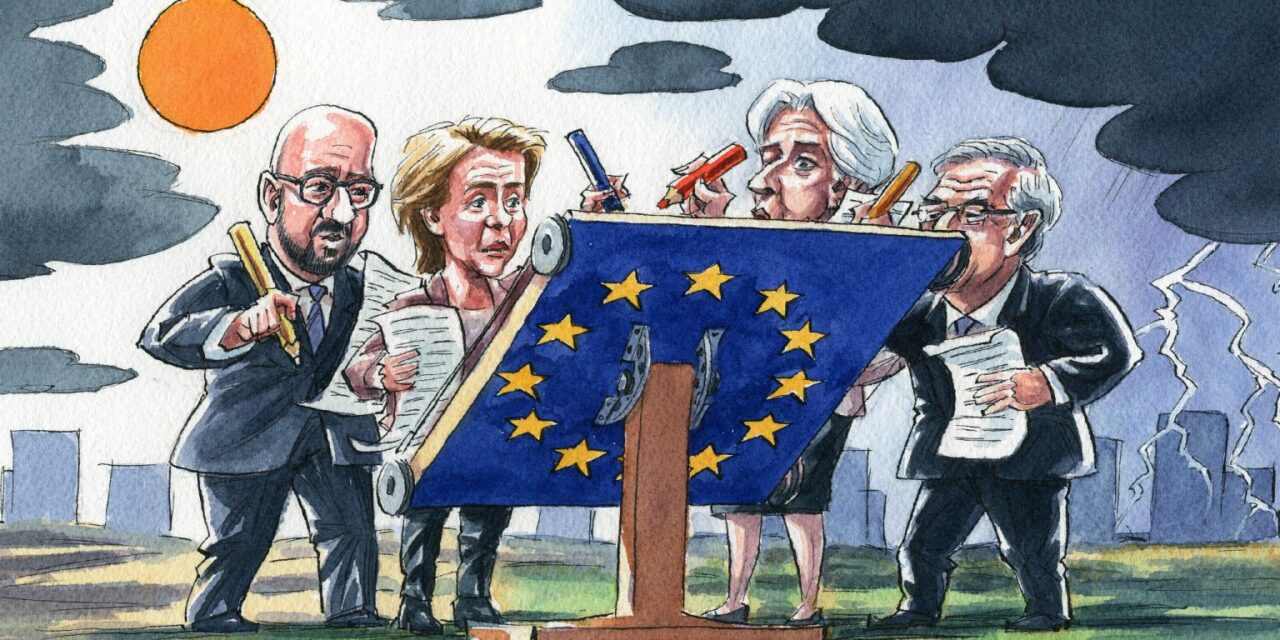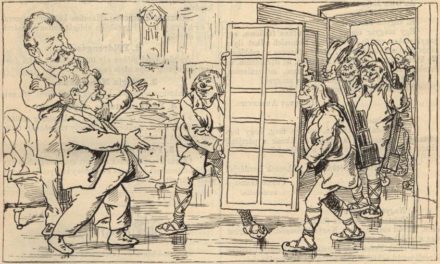Populist rebellion is our only hope to defend the true European values of democracy and national sovereignty.
Almost eighty years after Orwell wrote Politics and the English Language , the biggest crime of European Union bureaucrats is trying to "make lies the truth" and twist democracy into its inverse.
The joint declaration "EU legislative priorities for 2023 and 2024" signed by Robert Metsola, President of the European Parliament, Petr Fiala, Prime Minister of the Czech Republic and President of the European Council, and Ursula von der Leyen, President of the European Commission, is a real a treat for students of political doublespeak. The rabbit-sized document talks about everything from the European Green Deal to promoting our European way of life, but now only the last of the EU's six legislative priorities will be discussed:
"To protect our democracy and values from unprecedented threats, we will use all the means at our disposal to strengthen and protect the rule of law (…) strengthen democratic resilience from within and protect our democratic system from outside interests, disinformation and foreign interference."
Who could disagree with such healthy sentiments?
In reality, however, entrusting the protection of democracy to EU officials makes as much sense as leaving cabbage to goats. The institutions of the EU exist to curb democracy in Europe. Their role is exhausted in the centralization of power, and their goal is to isolate the European elite from popular will and accountability.In the worldview of Brussels, "democracy" today means what the EU oligarchy wants. So when the joint statement talks about "protecting our democracy and values against unprecedented threats", we know that this is not only against Vladimir Putin, but also against the populist rebellion that shook the pro-EU establishment from Italy and From the Netherlands to Sweden, Finland, France and of course the UK.
When the declaration obliges EU leaders to use all their means to "strengthen and protect the rule of law", we know
it is code for using the power of the European Commission and the courts to impose the will of Brussels on those EU member states whose governments dare to assume that national democracy means what we actually mean: they must pursue policies that the their constituents voted.(…)
From the 1950s to the present, the clear intention of the European political elite has been to create a supranational unity beyond the scope of national parliaments. For decades, the governments of many European nations voluntarily undertook the process of political unification in order to gain greater protection from public scrutiny and democratic accountability at home.
Despite the claim - "an ever closer union of the peoples of Europe" - the EU functions as a private organization of the European political elite, from which "the peoples" are excluded.
Let's look at the main institutions!
The heart of EU affairs is conducted through COREPER – the Committee of Permanent Representatives – which is made up of senior national officials and handles 90 percent of EU legislation. The board's proceedings are treated as a state secret, and its documents are generally considered "paperless," meaning they cannot be accessed by the press or the public. COREPER carries out the preparatory work for the regular meetings of the Council of the EU, where governments usually discuss EU legislation behind closed doors. Most of these have already been decided in the many committees and working groups of the Council, which all operate in secret. The EU's big showcase event is the regular meeting of the European Council, the "summit" of European leaders. There is no public record of what was said there, only a media photo and a summit statement prepared by COREPER.
This document, called Council Conclusions, binds governments to the agreement, regardless of what happens in their domestic policies or elections between meetings.
At the heart of the EU machinery is the powerful European Commission (EC), which is the public face of the EU and the only body that can propose legislation. The ECJ is an unelected executive body which, according to one of its former presidents, exercises "benign despotism". This bureaucratic body proposes and administers thousands of EU rules and regulations, in consultation with an army of technocratic experts and officials who wouldn't recognize a voter even if they bumped into them at lunch in a Brussels restaurant.
The powerful triumvirate of the Council, COREPER and the Commission, noted a critical historian, Perry Anderson, when such criticisms were still being made, means not only the absence of democracy, but also "the fading away of all politics as commonly understood".
The effect of this axis is to short-circuit national legislatures, above all at the critical level of COREPER, which are constantly faced with a mass of decisions over which they have no control whatsoever. Instead of being political issues to be debated and decided in national parliaments, important domestic policy issues are treated as technical issues to be settled and settled in committees and secret diplomatic summits.
But what about the European Parliament? After all, those hundreds of MEPs are directly elected by their nation's voters. And MEPs vote for the President of the Commission and, on paper at least, even have the power to remove commissioners if they agree together.
But! The European Parliament is not a legislative body - unlike functioning national parliaments, it does not have the right to propose and pass laws, but can only discuss and try to amend what comes from the desks of Commission bureaucrats. It does not elect a government like the parliaments of European nations.
True, the Parliament decided to support the candidate chosen by the Council, von der Leyen, for the position of President of the European Commission - a European President who was "elected" without receiving a single vote from the European people.But then he was the only candidate offered to MEPs. The debates in the European Parliament are certainly instructive. However, some of us may think that Parliament's main function for EU leadership is to provide a rather expensive and unconvincing democratic backdrop to a system in which real power is exercised through bureaucratic diktat and secret diplomatic deals.
The full article can be read on the European Conservative!
Featured image: Ingram Pinn graphics













